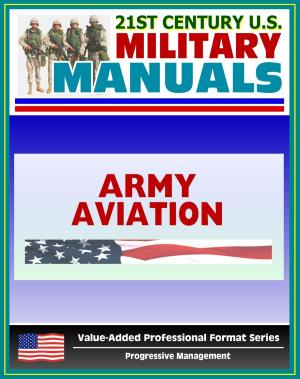Air Force Intelligence Role in Combating Weapons of Mass Destruction (WMD) - ISR, Targeting, Predictive Analysis, Gaps, HUMINT, SIGINT, IMINT, Counterproliferation, Chemical, Biological, Nuclear
Nonfiction, History, Military, Biological & Chemical Warfare, Nuclear Warfare| Author: | Progressive Management | ISBN: | 9781370218653 |
| Publisher: | Progressive Management | Publication: | September 18, 2016 |
| Imprint: | Smashwords Edition | Language: | English |
| Author: | Progressive Management |
| ISBN: | 9781370218653 |
| Publisher: | Progressive Management |
| Publication: | September 18, 2016 |
| Imprint: | Smashwords Edition |
| Language: | English |
This report has been professionally converted for accurate flowing-text e-book format reproduction. Air Force intelligence professionals play key roles in combating weapons of mass (WMD) destruction at combatant commands and components and national intelligence agencies. The Air Force, however, does not adequately prepare its intelligence analysts, targeteers, ISR operators, and unit-level and air and space operations center (AOC) personnel with the knowledge and the expertise required to fill these positions. This paper examines the current status of Air Force intelligence WMD expertise and proposes recommendations for improvement, utilizing Air Force intelligence-distinctive capabilities (predictive analysis, targeting, ISR operations, and unit-level and AOC operations) as a framework for discussion. In the areas of predictive analysis, targeting, and unit-level and AOC operations, Air Force intelligence training courses do not provide the requisite WMD expertise. The Air Force must leverage its technical and scientific core and expert organizations across the government to improve training for intelligence personnel requiring WMD expertise. In the area of ISR operations, the Air Force requires enhanced collection capabilities and better marketing of existing capabilities across the intelligence community. This paper also recommends changes to Air Force intelligence training, technical WMD expertise, and marketing and collection capabilities to improve the nation's ability to combat WMD.
After the United States and coalition forces failed to find weapons of mass destruction (WMD) stockpiled after Operation Iraqi Freedom, the president charged a congressional commission with examining US intelligence capabilities regarding WMD. No great surprise, the commission found that the intelligence community had been "dead wrong" in many of its prewar estimates. Air Force intelligence is part of that intelligence community and shares responsibility for that failure. Air Force intelligence professionals play important combating-WMD roles at combatant commands, components, national intelligence agencies, and in operational units.
In this paper Lt Col Cristina M. Stone argues that the Air Force does not adequately prepare its intelligence analysts; targeteers; intelligence, surveillance, and reconnaissance (ISR) operators; and unit-level and air and space operations center (AOC) personnel with the knowledge and expertise required to fill these positions. She examines the current status of the Air Force intelligence WMD expertise and proposes recommendations for improvement, utilizing Air Force intelligence-distinctive capabilities (predictive analysis, targeting, ISR operators, and unit-level and AOC operations) as a framework for discussion. To get to ground truth on the current status, the author conducted interviews with current and former WMD analysts and targeteers. Colonel Stone believes that in the areas of predictive analysis, targeting, and unit-level and AOC operations, Air Force intelligence training courses do not currently provide the requisite WMD expertise. The author recommends that the Air Force leverage its technical and scientific core and expert organizations across the government to improve training for intelligence personnel requiring WMD expertise. Regarding ISR operations, she proposes that the Air Force develop enhanced collection capabilities. This paper recommends changes to Air Force intelligence training, technical WMD expertise, collection capabilities, and marketing to improve the nation's ability to combat WMD.
This report has been professionally converted for accurate flowing-text e-book format reproduction. Air Force intelligence professionals play key roles in combating weapons of mass (WMD) destruction at combatant commands and components and national intelligence agencies. The Air Force, however, does not adequately prepare its intelligence analysts, targeteers, ISR operators, and unit-level and air and space operations center (AOC) personnel with the knowledge and the expertise required to fill these positions. This paper examines the current status of Air Force intelligence WMD expertise and proposes recommendations for improvement, utilizing Air Force intelligence-distinctive capabilities (predictive analysis, targeting, ISR operations, and unit-level and AOC operations) as a framework for discussion. In the areas of predictive analysis, targeting, and unit-level and AOC operations, Air Force intelligence training courses do not provide the requisite WMD expertise. The Air Force must leverage its technical and scientific core and expert organizations across the government to improve training for intelligence personnel requiring WMD expertise. In the area of ISR operations, the Air Force requires enhanced collection capabilities and better marketing of existing capabilities across the intelligence community. This paper also recommends changes to Air Force intelligence training, technical WMD expertise, and marketing and collection capabilities to improve the nation's ability to combat WMD.
After the United States and coalition forces failed to find weapons of mass destruction (WMD) stockpiled after Operation Iraqi Freedom, the president charged a congressional commission with examining US intelligence capabilities regarding WMD. No great surprise, the commission found that the intelligence community had been "dead wrong" in many of its prewar estimates. Air Force intelligence is part of that intelligence community and shares responsibility for that failure. Air Force intelligence professionals play important combating-WMD roles at combatant commands, components, national intelligence agencies, and in operational units.
In this paper Lt Col Cristina M. Stone argues that the Air Force does not adequately prepare its intelligence analysts; targeteers; intelligence, surveillance, and reconnaissance (ISR) operators; and unit-level and air and space operations center (AOC) personnel with the knowledge and expertise required to fill these positions. She examines the current status of the Air Force intelligence WMD expertise and proposes recommendations for improvement, utilizing Air Force intelligence-distinctive capabilities (predictive analysis, targeting, ISR operators, and unit-level and AOC operations) as a framework for discussion. To get to ground truth on the current status, the author conducted interviews with current and former WMD analysts and targeteers. Colonel Stone believes that in the areas of predictive analysis, targeting, and unit-level and AOC operations, Air Force intelligence training courses do not currently provide the requisite WMD expertise. The author recommends that the Air Force leverage its technical and scientific core and expert organizations across the government to improve training for intelligence personnel requiring WMD expertise. Regarding ISR operations, she proposes that the Air Force develop enhanced collection capabilities. This paper recommends changes to Air Force intelligence training, technical WMD expertise, collection capabilities, and marketing to improve the nation's ability to combat WMD.















